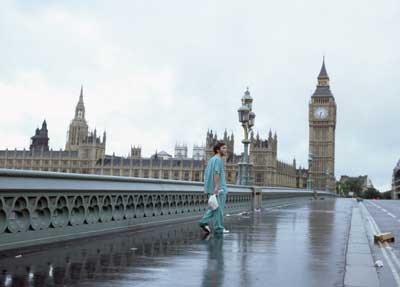 I'm
not going to bother trying to figure out all of the things which make little
or no sense during the course of 28 Days Later, as they are not only
impossible to explain given the little information we are given, but even some
of the things which we know make no real sense at all. What I can tell you is
that the film, for all of its flaws in the plausibility department, is a
success in delivering tension consistently with intelligence and emotion. It
is almost a thematic re-invention of a previous Danny Boyle (A
Life Less Ordinary, Trainspotting)
film, and one which was much more flawed in the dramatic department,
The Beach. It shouldn't come as a surprise to
know that the author of the book on which The Beach is based, Alex
Garland (Sunshine), would be the
screenwriter for 28 Days Later, and by Boyle sticking closer to the
source material, a much more effective result has been achieved.
I'm
not going to bother trying to figure out all of the things which make little
or no sense during the course of 28 Days Later, as they are not only
impossible to explain given the little information we are given, but even some
of the things which we know make no real sense at all. What I can tell you is
that the film, for all of its flaws in the plausibility department, is a
success in delivering tension consistently with intelligence and emotion. It
is almost a thematic re-invention of a previous Danny Boyle (A
Life Less Ordinary, Trainspotting)
film, and one which was much more flawed in the dramatic department,
The Beach. It shouldn't come as a surprise to
know that the author of the book on which The Beach is based, Alex
Garland (Sunshine), would be the
screenwriter for 28 Days Later, and by Boyle sticking closer to the
source material, a much more effective result has been achieved.
The initial scene of 28 Days Later
involves infiltration of an animal testing center by a group of militant
animal activists, who, in their quest for animal freedom, unknowingly release
a monkey infected with a virus which induces mindless rage. Apparently this
virus spreads through the ingestion of the blood of an infected person, and
within mere seconds of being infected, a human being will turn into a ravenous
zombie which only has one desire: to seek and infect others who do not have
the virus.
The next scene pushes us ahead
twenty-eight days, where Jim (Murphy, Batman
Begins) awakens from a coma only to find himself alone, not
just in the room, but the world as far as he can see. The world has radically
changed, now that the streets are deserted, and the only human contact seems
to come from the occasional rage-filled murderer. Later, he finds that he
isn't alone, and that there are others who haven't yet been afflicted by the
rage, and they form a band to combat the infected in the quest for survival.
As mentioned in the first paragraph,
28 Days Later is similar to Boyle and Garland's earlier work, The
Beach, in that it explores the dangers humans face, not only from total
anarchy, but from totalitarianism as well. It delves into what would happen
when humans succumb to their basest instincts, or as Freud would say, our Ids,
and in a poignant series of events, also explores the fact that the ability to
be infused with a rage is inherent in every human, whether infected with a
virus or not. Rage is everywhere, in everyone, and the human race is killing
itself as a result. There are subtexts of Darwin's "Survival of the Fittest"
throughout 28 Days Later, but also an irony that the more
technologically advanced we become, i.e. the less dependent on nature, the
more likely human society is to collapse into anger and fear. From road rage
on the highways, to corporate office shooting sprees, people out there are
just a push away from cracking under the pressure into mindless killing of
their own.
Danny Boyle does a fine job directing
a very competent troupe of actors, and although some may find the jump-cut
nature of the attacks unsettling (and possibly annoying), I thought it was
very effective because it not only showed the mindset of the infected but also
the point-of-view of the person being attacked. There are many impressive
scenes of a deserted London, which is a both a strength and a weakness,
because visions of a deserted road make us feel diminished while at the same
time makes us wonder why there are so few stranded vehicles littering the
area, especially if mass hysteria and a rapidly spreading virus were to hit
the place in a heartbeat. The film goes into high gear later changing from
sci-fi/horror to more of an action film, but during these scenes the momentum
seems to break apart and the focus blurs. Despite the turbulence, the story
holds itself together because, in the end, we do care about the characters and
what happens to them.
28 Days Later leaves many
questions unanswered, many ideas unexplained, and doesn't really hold up to
scientific scrutiny. It requires a good deal of suspension of disbelief and a
willingness to give the creators the benefit of the doubt. It is recommended
for fans of post-apocalyptic science fiction, zombie flicks, and those who
have been disillusioned with the paltry amounts of intelligent horror films to
come out in recent years. Yes, it's complete nonsense, but completely
riveting at the same time.
-- Followed by
28 Weeks Later
(2007)
Qwipster's rating:





©2003 Vince Leo

